七年级英语下册第10单元教案
2019-2020学年人教版英语七年级下册Unit 10 I’d like some noodle
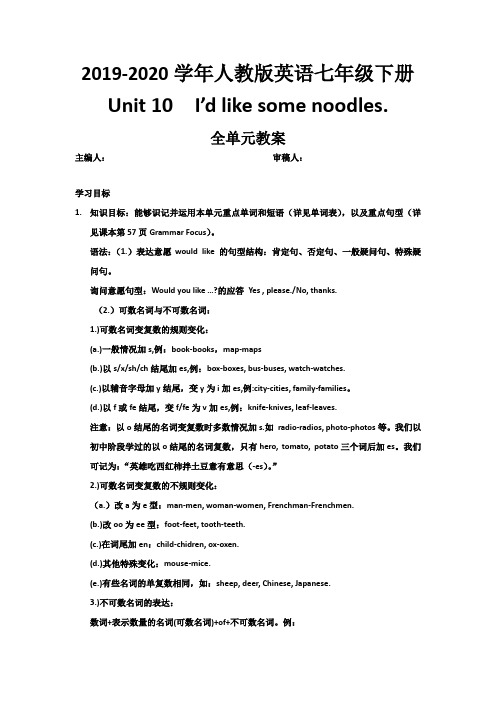
2019-2020学年人教版英语七年级下册Unit 10 I’d like some noodles.全单元教案主编人:审稿人:学习目标1.知识目标:能够识记并运用本单元重点单词和短语(详见单词表),以及重点句型(详见课本第57页Grammar Focus)。
语法:(1.)表达意愿would like 的句型结构:肯定句、否定句、一般疑问句、特殊疑问句。
询问意愿句型:Would you like …?的应答Yes , please./No, thanks.(2.)可数名词与不可数名词:1.)可数名词变复数的规则变化:(a.)一般情况加s,例:book-books,map-maps(b.)以s/x/sh/ch结尾加es,例:box-boxes, bus-buses, watch-watches.(c.)以辅音字母加y结尾,变y为i加es,例:city-cities, family-families。
(d.)以f或fe结尾,变f/fe为v加es,例:knife-knives, leaf-leaves.注意:以o结尾的名词变复数时多数情况加s.如radio-radios, photo-photos等。
我们以初中阶段学过的以o结尾的名词复数,只有hero, tomato, potato三个词后加es。
我们可记为:“英雄吃西红柿拌土豆意有意思(-es)。
”2.)可数名词变复数的不规则变化:(a.)改a为e型:man-men, woman-women, Frenchman-Frenchmen.(b.)改oo为ee型:foot-feet, tooth-teeth.(c.)在词尾加en:child-chidren, ox-oxen.(d.)其他特殊变化:mouse-mice.(e.)有些名词的单复数相同,如:sheep, deer, Chinese, Japanese.3.)不可数名词的表达:数词+表示数量的名词(可数名词)+of+不可数名词。
人教版七年级英语下册全册备课教案
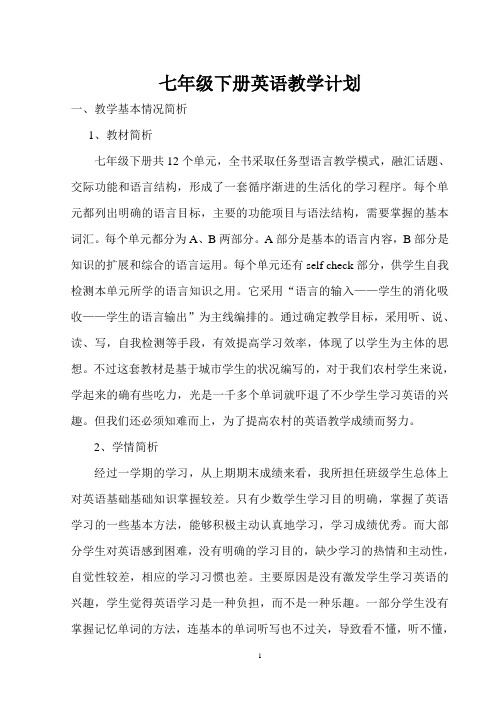
七年级下册英语教学计划一、教学基本情况简析1、教材简析七年级下册共12个单元,全书采取任务型语言教学模式,融汇话题、交际功能和语言结构,形成了一套循序渐进的生活化的学习程序。
每个单元都列出明确的语言目标,主要的功能项目与语法结构,需要掌握的基本词汇。
每个单元都分为A、B两部分。
A部分是基本的语言内容,B部分是知识的扩展和综合的语言运用。
每个单元还有self check部分,供学生自我检测本单元所学的语言知识之用。
它采用“语言的输入——学生的消化吸收——学生的语言输出”为主线编排的。
通过确定教学目标,采用听、说、读、写,自我检测等手段,有效提高学习效率,体现了以学生为主体的思想。
不过这套教材是基于城市学生的状况编写的,对于我们农村学生来说,学起来的确有些吃力,光是一千多个单词就吓退了不少学生学习英语的兴趣。
但我们还必须知难而上,为了提高农村的英语教学成绩而努力。
2、学情简析经过一学期的学习,从上期期末成绩来看,我所担任班级学生总体上对英语基础基础知识掌握较差。
只有少数学生学习目的明确,掌握了英语学习的一些基本方法,能够积极主动认真地学习,学习成绩优秀。
而大部分学生对英语感到困难,没有明确的学习目的,缺少学习的热情和主动性,自觉性较差,相应的学习习惯也差。
主要原因是没有激发学生学习英语的兴趣,学生觉得英语学习是一种负担,而不是一种乐趣。
一部分学生没有掌握记忆单词的方法,连基本的单词听写也不过关,导致看不懂,听不懂,学不懂。
学生的听力也还有待提高,在这方面失分也较多。
主要是听的时间太少,接触英语的时间不多。
还有极少部分学生已经放弃学习英语。
二、指导思想根据七年级学生的生理及心理特点和本学期的英语教学目标,我确定了如下的教学指导思想:激发学生学习英语的兴趣,培养他们学习英语的积极态度,使他们建立学习英语的自信心;培养学生的语感和良好的语音、语调基础,使他们形成初步运用英语进行日常交流的能力,为进一步学习打下基础。
七年级英语外研版下册教案通用5篇

七年级英语外研版下册教案通用5篇七年级英语外研版下册教案通用5篇英语教师研制一份教案,是为了加强课堂教学的目的性和计划性。
下面是小编为你准备的七年级英语外研版下册教案,快来借鉴一下并自己写一篇与我们分享吧!七年级英语外研版下册教案篇1一、指导思想在本学期的英语教学中,坚持《英语课程标准》中以下教学理念,面向全体学生,关注每个学生的情感,激发他们学习英语的兴趣,帮助他们建立学习的成就感和自信心,让学生在老师的指导下通过感知、体验、实践、参与和合作等方式,实现任务的目标,感受成功;注重过程评价,促进学生发展,建立能激励学生学习兴趣和自主学习能力发展的评价体系。
总之,让学生在使用英语中学习英语,让学生成为使用者而不仅仅是学习者。
让英语成为学生学习生活中最实用的工具而非累赘,让他们在使用和学习英语的过程中,体味到轻松和成功的快乐,而不是无尽的担忧和恐惧。
二、教材分析这套教材采用任务型语言教学模式,融汇话题、交际功能和语言结构,形成了一套循序渐进的生活化的学习程序。
与原教材相比还增加了文化背景和学习策略等部分,并增加了任务型学习成份和语篇的输入。
本书每个模块都列出明确的语言目标、主要的功能项目与语法结构、需要掌握的基本词汇,并分为三个单元。
Unit1部分是基本对话内容,Unit2部分是短文,主要是阅读训练。
Unit3是扩展和综合的语言运用。
三、学生基本情况分析我所任教的是七年级1、2班英语,只有少部分学生的英语基础较好,取得了一定的成绩,大多数学生不能明确学习英语的目的,没有真正认识到学习英语的目的在于交流;没有养成良好的.学习习惯,不能做好课前预习课后复习,不善于发现和总结语言规律,不注意知识的巩固和积累。
四、具体措施1、每天背诵课文中的重点对话。
目的:要求学生背诵并默写英语句子,培养学生良好的英语语感。
2、每天听写本节课中需要用到的重点生词,常用句子或习语。
利用“互测及教师抽查”及时检查,保证效果并坚持下去。
2024年七年级英语教学设计

2024年七年级英语教学设计2024年七年级英语教学设计1一、指导思想认真学习新课程教学大纲和全册教材。
明确教学任务和教材体系,把握重点单元和章节,在此基础上制订全学期授课计划。
掌握教材的教育因素和知识点,根据教材和学生的实际,确定重点难点,明确德育渗透,双基训练、智能培养等各项教学目标,精心设计教学程序,选定教学方法。
端正教育思想,全面贯彻教育方针,努力探索教学规律,遵循教学原则,积极推进素质教育.二、教学目标在新课程理论的指导下,我将以学校教育处和英语教研组工作计划为指导,积极听课,加强课堂教学,高效地完成本学期英语教学目标。
并积极参加教科研活动,加强理论学习,努力使自身的教学水平、业务能力有更大的提高。
同时,通过传授与学生生活密切联系的英语知识,训练英语的听说能力,培养学生学习英语的兴趣和运用英语的能力,最终使学生从“学会英语”向“会用英语”发展。
三、学情分析本学期我担任七年级(5)、(6)班的英语教学工作,七(5)班共有学生57人,男生33个,女生24个。
七(6)班有学生57人,男生32个,女生25个。
在这些学生中,两个班均是男生人数大于女生,学生英语基础知识和听说能力水平不一,大部分学生虽然在小学接触过英语,但应用能力十分薄弱,特别是听力题,大部分学生听起来都很吃力。
面对学生掌握英语的程度不一,我将采用高效课堂模式,分层教学与整体教学相结合的方式完成教学任务,努力提高他们的英语水平。
另外,两班学生在情感态度、学习策略和文化意识方面还存在诸多需要进一步解决的问题。
例如:个别学生不明确学习英语的目的;有些同学对学好英语缺乏自信,不敢用英语表达;缺乏小组合作意识;一些学生没养成良好的学习习惯,不能做好课前预习课后复习,学习没有计划性和策略性;不善于发现和总结语言规律,不注意知识的巩固和积累。
所以,现阶段最重要的是激发学生学习英语的兴趣和积极性,帮助他们增强信心,克服困难。
除了从思想上给予引导之外,更重要的是在教学上,有针对性、目的性、有系统、有计划地上好课。
初一英语第10单元

“教学中的互联网搜索”教案设计课题: Where did you go on vacation?单位:新疆乌鲁木齐市第92中学作者:苏莉Unit 10 Where did you go on vacation?教案背景:Where did you go last vacation?是七年级下第十单元内容。
其教学知识重、难点是过去式的认知、使用。
而当时学生按正常的教学进度才学完第八单元。
学生所认知掌握的是有关一般现在时知识。
在学生没有任何过去时基础知识背景下,即跨越两个单元,既要处理好动词的过去式,又要实现新词汇及目标语言的掌握。
教材分析:谈论过去时,需要将语言知识与学生实际生活相结合,以恰当的活动为载体,让学生在课堂中练习,掌握知识与能力。
教学方法:PPP(Presentation, Practice, Production)教案设计:Language aims(语言目标):Vocabulary New Words:camp, museum, guide, exam, rainy,New phrases:summer camp, the Great Wa ll, the Palace Museum, Tian’an Men Square, go to the mountains, on vacation, bus trip, feel happy Expressions:Where did you go on vacation? I went to New York City. Where did he /she go on vacation? He / She went to the mountains. Did you /he /she go to Central Park?Structures:Where did you go on vacation? I went to Summer Camp.Where did they go on vacation? They went to New York City.Where did he / she go on vacation? She / He visited his / heruncle.Did you / she / he / they go to Central Park?Yes, I / he/ she/ they do. No, I / he/she/they don’t.Teaching key point(教学重点):Where did you go on vacation? I went to Summer Camp.Where did they go on vacation? They went to New York City.Where did he / she go on vacation? She / He visited his / heruncle.Teaching difficult point(教学难点): The simple past tenseAbility aims(能力目标):Listening, speaking, reading and writing教学过程:Teaching proceduresStep 1: Warming upActivity 11.Play a guessing game to show the structure “What doyou do on weekend?”watch, clean, go, doAsk students to change the words into the past forms together.“What did you do last weekend?”watched, cleaned went and did,Read the past forms loudly.2.Give students a picture to show the differencesbetween the time and the tenses.Activity 2Go on asking where did you / he / she/ go last weekend using the verbs they learned. Focus their attention on the different forms of verbs.Step 2: PresentingLet students say out the verbs learnt before and teacher can help them say as many as possible. Show new words: summer camp, the Great Wall, the Palace Museum, Tian’an M en Square, go to the mountains, on vacation,1.Ask students: Did you stay at home yesterday?Did you stay at school last weekend?Where did you go on vacation?Where did your parents go on vacation?2.Repeat the new language points.Step 3: PracticingActivity 11. Change the forms of these verbs:2. Students work in pairs. Ask and answer about wheretheir parents, friends and they went yesterday / lastweekend / on vacation.Model: A: Where did you go yesterday?B: I stayed at home. Did you stay at home? A: Yes, I did. No, I did n’t. I went to the park.B: Where did your parents go on vacation?A: They went to Beijing last month.3. Check some pairs.Activity 21.Point to the pictures. Let students talk about wherethe people went in pairs.Model: visit ---visited2.Check the answers.Activity 31.Point out the numbered list of activities. Ask studentsto repeat.2.Then ask students to match each phrase with one of thepictures.3.Check the answers.Step 4: Practice1.Point to the pictures. Ask students to tell what theperson did in each scene.For example: She went to the mountains.He went to the beach.2.Do pairwork.3.Check some pairs.1.went to the mountains2.visited my uncle3.stayed at home4.went to New York City5.went to summer camp4.Students work in pairs. Ask and answer about where Tina/ Brad /Sally / Xiang Hua and Tom went on vacation. Step 5:Consolidation1. Memory challenge.2. Play it the first time, show how to do for students.3. Check the answers.Did Dory go to Central Park? Yes, she did.4. Fill in the blanks.5. Check the answers.6. True or false.Step 6: Practicing ( groupwork )Activity 11.Ask students in your group: Where did you go lastvacation?2. Give a talk about the last vacation of the studentsin your group.Step 7: HomeworkWrite a passage about your last vacation.教学设计优势该课在目标设定、教学过程、课程评价和教学资源的开发等方面我都以突出学生为主体的思想为指导。
初中语法第10单元教案

初中语法第10单元教案教学目标:1. 让学生掌握现在完成时的结构:主语 + have/has + 过去分词。
2. 让学生理解现在完成时的意义和用法。
3. 培养学生运用现在完成时描述过去发生的动作或存在的状态的能力。
教学内容:1. 现在完成时的结构。
2. 现在完成时的意义和用法。
3. 现在完成时的练习。
教学步骤:Step 1: 引入1. 教师通过提问引导学生思考过去发生的动作或存在的状态对现在的影响。
2. 学生分享自己的经历,如:“我昨天去了公园”,“我有一个新的铅笔”。
Step 2: 讲解现在完成时的结构1. 教师介绍现在完成时的结构:主语 + have/has + 过去分词。
2. 学生跟读并模仿。
Step 3: 讲解现在完成时的意义和用法1. 教师通过例句解释现在完成时的意义和用法。
- 我昨天去了公园。
(表示过去发生的动作对现在的影响)- 我有一个新的铅笔。
(表示过去发生的动作对现在的影响)2. 学生跟读并模仿。
Step 4: 练习1. 教师给出一些句子,让学生用现在完成时进行改写。
- 他吃了早餐。
(改写)- 她去学校了。
(改写)2. 学生独立完成练习,教师进行反馈和指导。
Step 5: 小组活动1. 学生分组,每组编写一个现在完成时的句子。
2. 每组轮流展示自己的句子,其他组进行评价和反馈。
Step 6: 总结1. 教师回顾现在完成时的结构和用法。
2. 学生提问并解答。
Step 7: 作业1. 教师布置作业:用现在完成时写一篇小作文,描述自己的一天。
2. 学生完成作业,教师进行批改和反馈。
教学评价:1. 观察学生在课堂上的参与程度和理解程度。
2. 批改学生的练习和作业,了解学生的掌握情况。
3. 学生对现在完成时的运用能力。
外研版英语七年级下册Module10_Unit 1 第1课时单元教案与反思

Module 10 A holiday journey东宫白庶子,南寺远禅师。
——白居易《远师》枫岭头学校张海泉Unit l第1课时自主学习方案1.学生自学新词汇(见教材P109)。
2.学生自学教材(P60),找出课文中重点词组和句子。
课堂导学方案Step 1情景导入教师询问学生:你们出去旅游过吗?如果出去过,那你们曾去过哪儿?和谁一起去的?你在哪里做过什么?等等。
然后邀请学生作答。
环节说明:教师的问话,开门见山导入本节的语言学习重点,学生们一定会有很大的兴趣来积极参入本节教学活动中去。
Step 2完成教材1的任务1.熟读任务1里的地点名称,为下列任务做准备。
2.在地图上找到这些地方。
3.听录音,按你听到的顺序把这些地方编号。
4.小结训练。
汉译英。
(1)I was so excited(兴奋的).(2) He has been to Pacific Ocean(太平洋).(3)Where are you going on holiday(假期)?环节说明:此环节是让学生熟练掌握新词汇。
Step 3完成教材2的对话理解1.大声朗读2,学生自己理解短文,然后找出重难点句子。
2.教师详细讲解。
学生熟记语言重点。
3.放录音,学生跟读。
熟悉教材,培养语感。
4.小结训练。
(A)(1)We __________ at the party last night. We were very happy.A. had a good timeB. had good timeC. had a timeD. had a hard time(B)(2)It __________ Li Ming 1 hour __________ his homework.A. took, doB. took, to doC. takes, doD. will take, do(A)(3)We know __________ about the moon now.A. a lotB. lots ofC. lotsD. lot环节说明:通过教师讲解,学生的理解记忆,小结训练让学生来熟悉教材,在学习本节的重点语言知识的同时也初步接触动词过去时态的特殊疑问句式。
人教版七年级英语下册unit 10 I'd like some nooodles. 全单元教案
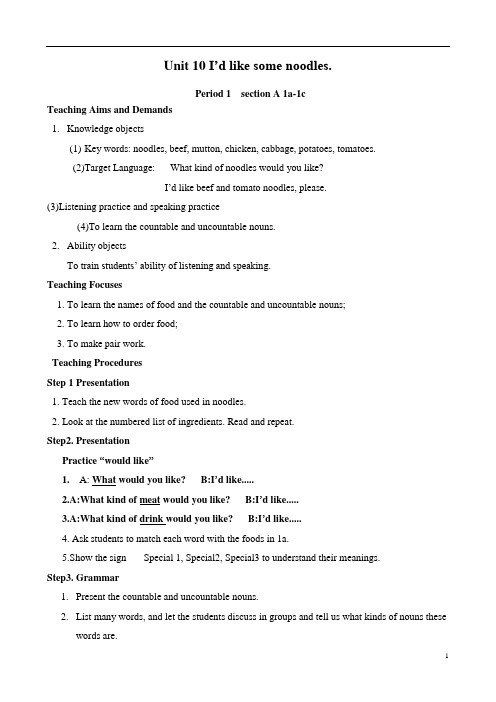
Unit 10 I’d like some noodles.Period 1 section A 1a-1cTeaching Aims and Demands1.Knowledge objects(1)Key words: noodles, beef, mutton, chicken, cabbage, potatoes, tomatoes.(2)Target Language: What kind of noodles would you like?I’d like beef and tomato noodles, please.(3)Listening practice and speaking practice(4)To learn the countable and uncountable nouns.2.Ability objectsTo train students’ ability of listening and speaking.Teaching Focuses1. To learn the names of food and the countable and uncountable nouns;2. To learn how to order food;3. To make pair work.Teaching ProceduresStep 1 Presentation1. Teach the new words of food used in noodles.2. Look at the numbered list of ingredients. Read and repeat.Step2. PresentationPractice “would like”1.A: What would you like? B:I’d like.....2.A:What kind of meat would you like? B:I’d like.....3.A:What kind of drink would you like? B:I’d like.....4. Ask students to match each word with the foods in 1a.5.Show the sign ___Special 1, Special2, Special3 to understand their meanings.Step3. Grammar1.Present the countable and uncountable nouns.2.List many words, and let the students discuss in groups and tell us what kinds of nouns thesewords are.Step4. PresentationPresent the target language as following:A: What would you like?B:I’d like.....A: What kind of noodles would you like?B: I’d like beef and tomato noodles, please.Step5. Practice the drill1、Read the conversation above.2、Ask students to work in pairs. One person is the waiter, the other one is the customer. Thenlet them perform the conversation in front of the classroom.Step6. Listening1b1、Show three bowls of noodles in picture. Ask: What ingredients are in these noodles?2、Play the recording the first time .Students only listen.3、Play the recording a second time and correct the answers.Step7. PresentationMake a survey to your friends. Ask: What kind of noodles would you like? Fill in the form, then make a report.Step8. PresentationPresent the target language as following:A: What size bowl of noodles would you like?B: I’d like a large / medium / small bowl of noodles.Step9. Role playLet the students perform the conversation as following, imagining they are in a restaurant (Each student can be both the waiter and the customer):A: What kind of noodles would you like?B: I’d like beef and tomato noodles, please.A: What size bowl of noodles would you like?B: I’d like a large / medium / small bowl of noodles.Step10. Listening1、Listen and check the names of the foods they hear in 2a.2、Listen and fill in the blanks in 2b.Play the recording a second time.Step11.Pair work1. Ask and answer questions with your partner. Use the information in 2a.2. Show the conversations of 2a on the big screen to the Ss.3. Make a model for the Ss.T: What kind of noodles would you like?S1: I'd like beef noodles, please.…3. Ss work in pairs and practice the conversations.Step 12. Role-play1. Ask Ss to read the conversation in 2d and find the answer to this question:What would they like?(They would like one large bowl of beef soup, one gongbao chicken, and one mapo tofu with rice.)2. Check the answers with the Ss.3. Ss work with their partners and role-play the conversation.Step 13 . Language points1. May I take your order? 你可以点菜了吗?也可以说“Can I take (have) your order?”,“Are you ready to order?”这些都是服务员请客人点菜的礼貌用语。
人教版七年级英语下册教案 Unit 10 单元导学

Unit10 I'dlikesomenoodles.
1.本单元话题以“食物”展开,情境属于新课标“人与社会”主题范畴中的“历史、社会与文化”这一主题群,涉及子主题“跨文化沟通与交流,语言与文化”。
2.单元主题体现《中国学生发展核心素养》中的“文化基础”方面,提升学生的“人文底蕴”这一素养,立足于“人文情怀”这一基本要点。
3.能识记有关食品的词汇;能正确识别可数名词与不可数名词;能熟练运用“Whatkindofnoodlesdoyouhave ?”“Whatsizewouldyoulike?”等句子询问他人对食物的要求。
4.通过听听力材料,获取与食物相关的信息。
5.能运用wouldlike 进行写作。
6.在交流中学会热情好客,礼貌地表达自己的需要。
续表
【课时建议】本单元建议5课时
SectionA(1a-1c)(一课时)
SectionA(2a-2d)(一课时)
SectionA(GrammarFocus-3c)(一课时)
SectionB(1a-1d)(一课时)
SectionB(2a-SelfCheck)(一课时)
词汇短语:主要采用图片及多媒体展示助记忆法。
基本句子:采用多媒体展示及交际法(利用多媒体展示两人进行交际时的情景)。
语法:学会如何点餐。
人教版七年级英语下册Unit10_Section_A(1a-2d)名师教案

Unit10 Section A(1a-2d)名师教案【教材版本与册数】新目标人教版七年级下册【单元名称】Unit 10 I’d like some noodles.【课时】Section A1a-2d(第1课时)【课型】Listening and speaking(听说课)附:教学活动设计步骤过程措施(教师活动与学生活动)目的持续性评价1预备与激活先期知识Step 1Greeting andLeading in(2mins)Show a picture and let the students answer the questionsbelow:1)Can you see three bowls?2)What are in them?3) Do you like noodles?4)Can you find the differences among the three bowls ofnoodles?通过图片引入话题,并通过提问引入课时单词学习。
部分学生能说出“noodles”,少部分学生能说出“beef noodles”。
2获取新知识Step 2Pre-listening(3mins)1. Teach the new words of food used in noodles.2. Look at the numbered list of ingredients. Read andrepeat.3. Ask students to match each word with the foods in 1a.4. Present the countable and uncountable nouns.5.List many words, and let the students discuss in groupsand tell us what kinds of nouns these words are.Ss practice in pairs like this:A: What kind of noodles would you like?B: I’d like beef and tomato noodles, please.A: What size bowl of noodles would you like?为1b的听力作铺垫准备和搭支架,这样通过直观图片和单词匹配的方式,能让学生更容易记住这些食物名称,也为后面的听说活动扫清了一部分词汇障碍。
七年级下册英语Unit10教案及说课稿设计

Unit10 I’d like some noodles说课稿设计一、说教材〔一〕教材概述本课是人教版新目标英语七年级下册Unit 10 I’d like some noodles.第一课时。
本单元的中心话题是学会如何在饭店订餐以及进行简单的广告或海报的简单写作,本课时要求掌握基本点餐需要的词汇及基本用语,如面条,饮料等的种类及碗的大小的表达。
主要语言点要求掌握would like的用法,列出具体句型。
通过本课的学习进一步培养学生的跨文化意识和语言综合运用能力。
〔二〕教学目标1、知识与能力目标〔1〕、语言知识目标:通过学习是学生掌握并能熟练运用四会三会词语、句型,并对可数名词和不可数名词的进一步学习与区分。
Words: noodle beef cabbage potato special size bowl muttonSentences: What kind of noodles would you like? / What size bowl of noodles would you like?I’d like some ….〔2〕、语言技能目标:能运用所学词汇、句型点餐,能在真实情景中熟练运用。
2、过程与方法目标:培养学生自主学习的能力、语言综合运用能力、听力、英语会话能力、与他人合作的能力。
3、情感态度与价值观目标:通过创设真实的点餐情景,让学生身临其境感受和体验,使语言学以致用,做到“在用中学,在学中用”,激发学生的学习积极性。
体会在活动中学习英语的乐趣。
培养学生乐于与他人合作的精神及养成科学的饮食习惯。
4、文化意识目标:通过对中、西方在饮食及用餐方面异同的比照,对祖国饮食文化能有更深刻的了解。
乐于了解异国文化,加强对文化差异的理解与认识。
5、学习策略目标:通过学习,使学生在一定程度上形成自主学习、探究学习、合作学习的习惯,有效培养学生的英语思维能力。
〔三〕、教学重点与难点重点:1、学习日常生活中有关食物的名称。
最新冀教版七年级下册英语教案(全册)
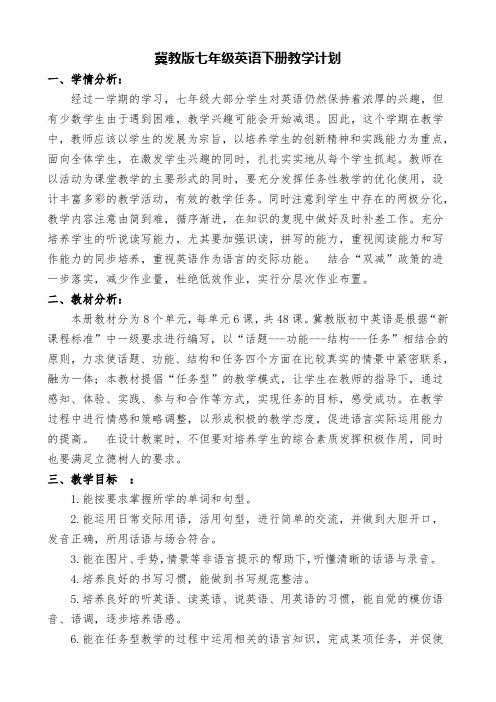
冀教版七年级英语下册教学计划一、学情分析:经过一学期的学习,七年级大部分学生对英语仍然保持着浓厚的兴趣,但有少数学生由于遇到困难,教学兴趣可能会开始减退。
因此,这个学期在教学中,教师应该以学生的发展为宗旨,以培养学生的创新精神和实践能力为重点,面向全体学生,在激发学生兴趣的同时,扎扎实实地从每个学生抓起。
教师在以活动为课堂教学的主要形式的同时,要充分发挥任务性教学的优化使用,设计丰富多彩的教学活动,有效的教学任务。
同时注意到学生中存在的两极分化,教学内容注意由简到难,循序渐进,在知识的复现中做好及时补差工作。
充分培养学生的听说读写能力,尤其要加强识读,拼写的能力,重视阅读能力和写作能力的同步培养,重视英语作为语言的交际功能。
结合“双减”政策的进一步落实,减少作业量,杜绝低效作业,实行分层次作业布置。
二、教材分析:本册教材分为8个单元,每单元6课,共48课。
冀教版初中英语是根据“新课程标准”中一级要求进行编写,以“话题---功能---结构---任务”相结合的原则,力求使话题、功能、结构和任务四个方面在比较真实的情景中紧密联系,融为一体;本教材提倡“任务型”的教学模式,让学生在教师的指导下,通过感知、体验、实践、参与和合作等方式,实现任务的目标,感受成功。
在教学过程中进行情感和策略调整,以形成积极的教学态度,促进语言实际运用能力的提高。
在设计教案时,不但要对培养学生的综合素质发挥积极作用,同时也要满足立德树人的要求。
三、教学目标:1.能按要求掌握所学的单词和句型。
2.能运用日常交际用语,活用句型,进行简单的交流,并做到大胆开口,发音正确,所用话语与场合符合。
3.能在图片、手势,情景等非语言提示的帮助下,听懂清晰的话语与录音。
4.培养良好的书写习惯,能做到书写规范整洁。
5.培养良好的听英语、读英语、说英语、用英语的习惯,能自觉的模仿语音、语调,逐步培养语感。
6.能在任务型教学的过程中运用相关的语言知识,完成某项任务,并促使语言能力的提高。
外研版七年级英语下册全册教案教学设计版
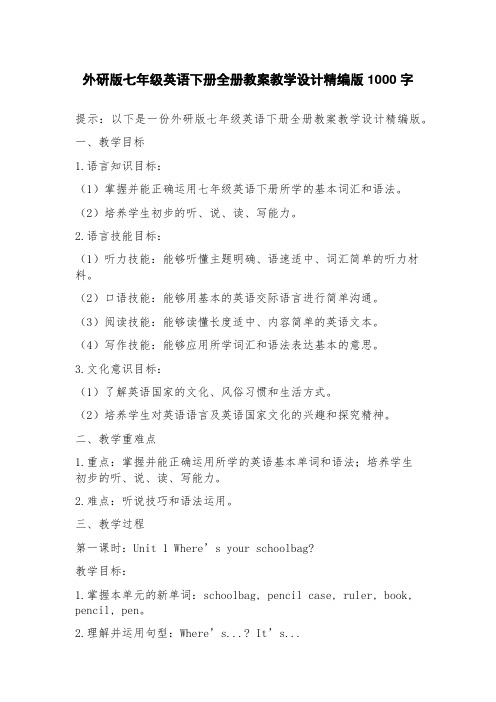
外研版七年级英语下册全册教案教学设计精编版1000字提示:以下是一份外研版七年级英语下册全册教案教学设计精编版。
一、教学目标1.语言知识目标:(1)掌握并能正确运用七年级英语下册所学的基本词汇和语法。
(2)培养学生初步的听、说、读、写能力。
2.语言技能目标:(1)听力技能:能够听懂主题明确、语速适中、词汇简单的听力材料。
(2)口语技能:能够用基本的英语交际语言进行简单沟通。
(3)阅读技能:能够读懂长度适中、内容简单的英语文本。
(4)写作技能:能够应用所学词汇和语法表达基本的意思。
3.文化意识目标:(1)了解英语国家的文化、风俗习惯和生活方式。
(2)培养学生对英语语言及英语国家文化的兴趣和探究精神。
二、教学重难点1.重点:掌握并能正确运用所学的英语基本单词和语法;培养学生初步的听、说、读、写能力。
2.难点:听说技巧和语法运用。
三、教学过程第一课时:Unit 1 Where’s your schoolbag?教学目标:1.掌握本单元的新单词:schoolbag, pencil case, ruler, book, pencil, pen。
2.理解并运用句型:Where’s...? It’s...3.能够简单的进行对话,介绍自己的物品在什么地方。
4.能够听懂简单的提问和回答。
教学重点:1.教学本单元的新单词及基本对话句型。
2.能够举一反三,灵活运用句型进行简单对话。
教学难点:1.培养学生听说能力。
2.让学生灵活运用所学句型。
教学准备:1.学生书和教师书。
2.单词抽认图片和多媒体设备(如幻灯片、录音机等)。
3.学习卡。
教学过程:1.引入新课:(5分钟)A.放学生熟悉的歌曲,让学生积极参与。
歌曲使学生放松心情,更容易进入英语学习状态。
B.用图片抽认单词。
让学生通过图片学习本单元新单词。
2.新课讲解:(25分钟)A.学习新单词:schoolbag, pencil case, ruler, book, pencil, pen。
人教版七年级英语下册第十单元教案

UNIT 10 I’d like some noodles.Section A 第1课时(1a〜1c)自主学习方案1.自学生词,并记住拼读及拼写。
2.预习课本找出重点短语及句子。
(见学案自学导练内容)3.读记后完成自学导练内容。
课堂导学方案Step1 情景导入Everyone has his own taste. So what kind of food do you like?What’s your favorite food?Do you like noodles?What kind of noodles do you like?Today we'l talk about the kinds of noodles.环节说明:就学生感兴趣的身边的话题导入新课,简洁明了,引人入胜。
Step 2完成教材1a—1c的任务1.学生认真观察1a图片中的食物,然后将词语与图片搭配,集体核对答案。
(2分钟)2,老师领读单词,并纠正发音。
(2分钟)3.学生认真听录音,标出顾客所点的面条,集体核对答案,完成课本上1b的听力任务。
(3分钟)4.两人一组练习1a中的对话,然后编新对话进行练习,并请一些学生表演出他们的对话。
(5分钟)参考案例:A:What would you like?B: I,m not sure yet. Are there any vegetables in the mutton noodles?A: Yes,there are some cabbages.B: OK,I’d like the mutton noodles.5.小结训练。
(2分钟)(1)一Would you like some beef?— C .A. Yes,I wouldB. No,I wouldn’tC.Yes, pleaseD. Thanks(2)There are B hamburgers in our restrant. Would you like ?A.some;someB. some;anyC.any; anyD. any;some环节说明:听说结合,第一时间向学生传达语言目标,通过结对对话练习和小结训练,使语言目标得以强化。
人教版初中七年级英语下册第十单元Unit10教案含教学反思

⼈教版初中七年级英语下册第⼗单元Unit10教案含教学反思第10单元I’d like some noodles.类别课程标准要求掌握的内容话题Food⾷物Section A 单词noodle n.⾯条beef n.⽜⾁potato n.⼟⾖;马铃薯would modal v.(表⽰意愿)愿意yet adv.还;仍然large adj.⼤号的;⼤的order n.& v.点菜;命令size n.⼤⼩;尺码bowl n.碗meat n.(可⾷⽤的)⾁special n.特⾊菜;特价品adj.特别的;特殊的cabbage n.卷⼼菜;洋⽩菜mutton n.⽺⾁tofu n.⾖腐短语would like愿意;喜欢take one’s order 点菜what size多⼤(尺⼨)one (large)bowl of…⼀(⼤)碗……what kind of哪⼀种……句型1.—What would you like? 您想要点什么?—I’d like some noodles. 我想要些⾯条。
2. Are there any vegetables in the beef noodles?⽜⾁⾯⾥有蔬菜吗?3. We’d also like gongbao chicken and some mapo tofu with rice.句型1. The number of candles is the person’s age.蜡烛的数量是过⽣⽇的⼈的年龄。
2. If he or she blows out all the candles in one go,the wish will come true. 如果他/她⼀⼝⽓吹灭所有的蜡烛,许的愿望便会成真。
3. They never cut up the noodles because the long noodles are a symbol of long life. 他们从不切碎⾯条,因为长长的⾯条是长寿的象征。
七年级英语下册教案

七年级英语下册教案篇一:2022人教版七年级下册全册英语教案英语七年级(下)教案一、【教学目标】(一)语言知识1.词汇掌握wake,early, first,day, term,must,still,by,onfoot,the same to,usually,always,Ms.,boat,ship,sea,train,by plane/air/airplane, etc.2.理解Subway Worm reporter,Net Bar,roller skating Measuredining hall,dormitory bookstore,etc. (二)语法1.一般现在时(Simple present)2.频度副词(Adverbs of frequency)never, seldom, sometimes,often, usually, always, once, twice3.现在进行时(Present continuous) a. I’m looking for a book.b. Are you doing your homework? Yes, I am./No, I’m not.c. Is he/she...?Yes, he/she is. /No, he/she isn’t.d. What are you doing now? I’m playing computer games.e. What is he/she doing? He/She is...4.谈论交通方式(Talking about means of transportation) How do you usually go to school? I usually go to school by bike. (三)功能用语与话题1.采访(Interviews)Our guest today is Michael from Class 2, Grade 1.2.谈论日常生活(Talking about routines)3.学校建筑(School buildings)swimming pool, playground,library, dormitory, lab, gym4.谈论兴趣喜好(Talking about interests, likes and dislikes)I like the swimming pool best. Why do you like English? Because it’s interesting and easy. 5.借物(Borrowing things)How long can I keep it? Two weeks. 6.新闻(News)、海报(Poster)Attention,please! Here is the news.7.谈论学校活动、科目和时间表(Talking about school activities,subjects and timetable) 8.谈论学校生活(Talking about school life)(四)能力培养【听】能听懂谈论校园生活中比较熟悉的话题,识别主题,获取主要信息。
人教版初中七年级英语下册第十单元Unit 10 教案含教学反思

第10单元I’d like some noodles.类别课程标准要求掌握的内容话题Food食物Section A 单词noodle n.面条beef n.牛肉potato n.土豆;马铃薯would modal v.(表示意愿)愿意yet adv.还;仍然large adj.大号的;大的order n.& v.点菜;命令size n.大小;尺码bowl n.碗meat n.(可食用的)肉special n.特色菜;特价品adj.特别的;特殊的cabbage n.卷心菜;洋白菜mutton n.羊肉tofu n.豆腐短语would like愿意;喜欢take one’s order 点菜what size多大(尺寸)one (large)bowl of…一(大)碗……what kind of哪一种……句型1.—What would you like? 您想要点什么?—I’d like some noodles. 我想要些面条。
2. Are there any vegetables in the beef noodles?牛肉面里有蔬菜吗?3. We’d also like gongbao chicken and some mapo tofu with rice.句型1. The number of candles is the person’s age.蜡烛的数量是过生日的人的年龄。
2. If he or she blows out all the candles in one go,the wish will come true. 如果他/她一口气吹灭所有的蜡烛,许的愿望便会成真。
3. They never cut up the noodles because the long noodles are a symbol of long life. 他们从不切碎面条,因为长长的面条是长寿的象征。
Unit 10 Spring Festiva1_陈孝伟

Unit 10 Spring FestivalUnit 1 Are you getting ready for Spring Festival ?教案背景:1、面向学生:中学生2、学科:英语外研社七年级上学期3、课时: 14、学生课前准备: 1)预习单词对话2)通过百度搜索引擎【】查找与本单元相关的资料教学目标:知识目标:1、学习、理解本单元的新单词、短语:get ready for Spring Festival happen learndragon dance lantern clean help sweep floor cook meal at work 等,掌握他们的基本含义和用法,并能准确的加以运用。
2、学习、理解和掌握现在进行时的一般疑问句的肯定和否定回答,并能准确地加以运用。
能力目标:1、能听懂有关春节话题的讨论,并了解大意,,从中获取主要信息。
2、能准确的读出/l/ /w/ /j/的读音。
3、能用本模块的所学的现在进行时的一般疑问句进行组句。
情感态度目标:通过这一单元有关春节话题的讨论和学习,让学生深刻了解这一节日的文化内涵,培养学生的爱国主义情感。
教学重点:掌握本单元的单词和短语,并能准确的加以运用。
教学难点:掌握现在进行时的一般疑问句的肯定和否定回答,并熟练运用。
教学过程:1、教学之前用百度搜索引擎[]在网上搜索与春节有关的剪纸春联等图片。
/so?q=%E4%B8%8E%E6%98%A5%E8%8A%82%E6%9C%89%E5%85%B3%E7%9A%84%E6%98%A5%E8%81%94导入新课,师生问候。
T: What’s the weather like today ?Ss: It’s fine .T: Today we’ll learn Module 2 Spring Festival Unit 2 We’ getting readyfor Spring Festival. Do you know it ?Ss:Yes .T: And I want to know how you spend every year’s Spring festival .Whocan try ?S1: My family get together ,watch TV .S2 :My family get together ,watch TV and eat dumpings .教师鼓励学生发言,并根据学生的发言进行小结。
复习教案人教版七年级英语下册

七年级下复习教案
大单元教学设计一,单元内容分析(课标分析)
二,单元教学目标
三,学情分析
总复习阶段,学生的态度总体较为积极。
绝大多数学生对英语总复习持有较高的兴趣和主动学习态度。
他们愿意参与课堂活动,并愿意主动与教师和同学进行交流。
然而,也有一部分学生对英语复习缺乏热情,需要教师的教育和激励,大部分学生的英语整体水平较为均衡。
大多数学生能够熟练掌握基本的英语语法和词汇,并能够进行简单的听说读写。
然而,仍有一部分学生的英语水平相对较低,需要额外的支持和指导。
四,教学要点和课时安排
单元分课时设计
单元分课时设计
单元分课时设计。
- 1、下载文档前请自行甄别文档内容的完整性,平台不提供额外的编辑、内容补充、找答案等附加服务。
- 2、"仅部分预览"的文档,不可在线预览部分如存在完整性等问题,可反馈申请退款(可完整预览的文档不适用该条件!)。
- 3、如文档侵犯您的权益,请联系客服反馈,我们会尽快为您处理(人工客服工作时间:9:00-18:30)。
仁化二中 Orla单元整体说明I.单元教材分析本单元是九年制义务课程标准实验教科书七年级英语下册第10单元教案。
本单元的核心话题是用一般过去时谈论度假等发生在过去的事情。
因此“Where did you go on vacation?"" Did you go to the beach? Yes,I did.No,I didn’t.”等是教学的重点。
通过对本单元的学习,学生能掌握本单元出现的地点名词,用于询问和回答过去发生的事情的短语和句型。
II.单元知识结构(1)词汇:museum, exam, New York City; Central Park,exam,were,rainy, delicious,crowded expensive,cheap, water, cry, feel, corner, back, decide, the Great Wall, the Palace Museum, Tian’an Men Square. etc(2)句型:Where did you go on vacation? I went to summer camp.Did she go to Central Park?Yes,she did.No, she didn’t。
How was the weather? It was humid.(3) 语法:一般过去时特殊疑问句、一般疑问句及肯、否定回答。
III.单元总体目标1.Master the vocabulary2.Master and use:Where did you go on vacation?I went to summer camp·Did she go to Central Park?Yes,she did.No, she didn’t单元教学重难点一览重点难点1.V ocabulary and Expressions2. Grammar Focus:Where did you go on vacation?I went to summer camp. Did she go on Central Park?Yes, she did./ No, she didn’t Use the simple past tense to talk about activities that happened in the past in English with the foll owing sentences:Where did you go on vacation?Did you go to…?Yes. … /No,…IV.单元学情分析学生在第九单元已接触过一般过去时,具有了学习本单元知识的认知前提,能自然地与本单元话题进行衔接。
假期活动Such as; take a trip,go to summer camps, go fishing, go swimming, and so on接近学生的生活,They are all interested in talking about it.本节公开课的内容是Section B的2a,2b,3a,3b部分,第4课时。
Section B(二)I. 教学内容Section B中2a.2b.3a,3b.II. 教学目标(1) 知识与能力(Knowledge Objects)1.Match the vocabulary:delicious, awful expensive, inexpensive, crowded,felt, corner, walk, the Great Wall, Tiananmen’s Square, the Palace museum, Hutong2. Master and use:Where did Vera go on vacation?Did Vera like the vacation?How were the stores? They were very expensive.(2)能力目标:(Ability objects)Train students’ listening and writing skills.Train students’ speaking skill and reading skills.(3.)道德目标:(Moral Object)People often can’t help buying something they really don’t need on holiday. So think before guying.(2) 过程与方法通过多媒体图片大量练习句型,提出问题,解决问题,体现师生互动。
引入本课,设置会话情景来激发学生兴趣,调动其学习主动性。
利用情感态度价值观教育学生热爱生活,积极参与班级集体活动。
(3)教学重、难点及教学突破重点:1.The vocabulary:water, cry, feel, corner, back, decide, the Great Wall, the Palace Museum, Tian’an Men Square. etc2. language:Where did you \ they\ he\ she go on vacation?I\They \ He\She went to Japan.How were the museums/ people /stores? They were crowded expensive /friendly.难点:Use the language to talk about past events.教学突破:对于本课的单词短语通过多媒体图画和设置的情境来引出学习。
Language: Where did you go on vacation?及答语的学习,借助于课本及课件的图画来引出。
教学准备教师准备:录音机、磁带、课件学生准备:预习生词和课文。
教学步骤教学步骤、时间教师活动学生活动电脑应用Step 1Organization(1’) Organize Ss by greeting each other. Greeting to T.Step 2 Revision(5’) 1.Review some adjectives:Ask:What do you think of this book?Is it interesting?(通过对话引出前一节课所学的形容词expensive 等,知识回忆)Ask Ss use these words to make some sentences.2.Review the target language of this unit, through showing Ss some picturesAsk: Look at these pictures,and answer my questions:A: What did he / s he / they / do over the weekend?B: Where did he / she / they / go on vacation? Answer the questio nstogetherSay:It’s expensive. One by one Ss stand up and answer these questions.One by one Ss stand up and an swer these questions. 多媒体体图片多媒体体图片Step 3Listening(2a)(4') 1. Point out the two questions. Say: After you hear the conversation, plea se answer these questions. 2. Read the questions to the class.3. Play the recording the first time. Students only listen.This time say, listen to the recording and write the answer to each question.3. l isten to the recording the second time.correct the answers.1.She went to Tokyo.2. Yes, she did.Tape script Girl: Hi, Vera , How was your vacation?Vera: It was great!Girl: Where did you go?Vera: I went to Tokyo with my family.Girl]: Really? Wow!What did you do there?Vera:Well, we went to a lot of museums.Girl: Oh, how were they?Vera: They were really interesting. But they were also very crowded. Did you meet any Japanese p eople?Vera: Yeah,the people were really friendly.My parents have some Japanese friends,and we had dinner at their house.Girl:How was the food?Vera:It was delicious.I love Japanese food. Ss listen to the tape and fill in the blanks.Ss check the an swer together. Use computer show Ss the form of the listening. Show Ss the answers of 2a. Step 4Listening(2b)(7’) This activity provides furtherlistening practice using the target language Call attention to the chart. Read the words in the chart:Her vacation, the museum the stores,the people,the food.Point out the sample answer. Say,What does Vera think of her vacation? It was great.Play the recording. Play the recording a second time.Ask students to finish filling in their answers and to check their answers.Correct the ans wers.Answers.vacation-greatpeople -- friendlymuseums一interesting, crowdedfood-- deliciousstore一expensivedelicious relaxing Listen.Then answer.Listen and write.Then discuss the keys in pairs Read and practice in pairs.Read aloud. then discuss the keys.Listen and fill in thechart.Then di scussthe keys. RecorderUse computer show them the answers.多媒体多媒体Step 5Pair work(10’) Use the target language to make a diologue talk about your own vacation.T his activity provides guided oral practice using the target language.Call attention to the question words.Practice with a student to make an example for the class .Ask Where did you go on vaca tion? Say,please work in pairs.As students talk,move around the roomoffering pronunciation and language support as needed. Pair WorkSs wor k in pairs and use the target language to talk about their own vocation.Sptep 5Reading(12’)3a 1.Let the students read Kim’s travel diary and find the new words.2.Teach the new words: water ,cry, feel, corner,etc.Expla in the meaning and the usage of the new words.Let the students write the new words.3.Say,Now read the diary and circleall the good things about Bob’s holiday.Underline all the bad things. Ask them to notice the de script ion words that tell them w hether something is“good”or “bad,” You may want to ask a student to tell you what the first “bad thing” was.4.Check the answers.AnswersGood things:The weather(great) The beach(beautiful)Playing in the waves(fun)Helped the small boy find his fa ther(happy)Playing tennis (really fun)Eating Sichuan food (delicious)Bad things:Shops were too crowedMuseum (boring)No money for taxi/walking back tohotel(tired)5.The teacher tell the students the methods of writing the diary. Read Bob's travel diary and find out the new words.Read the new words after then write them in the notebooks.Read again and finish the activity individually.Then discuss in pain:Read aloud,Then read the diary,try to learn the key words by hearts.Check the answers. Show the main points to SsShow Ss the go od things and the bac things on computerSummary(5’) Sum up the main points of this class and do some writing practice to consolidate t he knowledge we learned. Ss do the exercises. Show the exercise on computerHomework(1’) Imagine you are an American student on vacation in Beijing.Writea travel diary. Show the exercise on computer本课小结本节课总共学习了7个新单词以及复习巩固了where和how句式。
